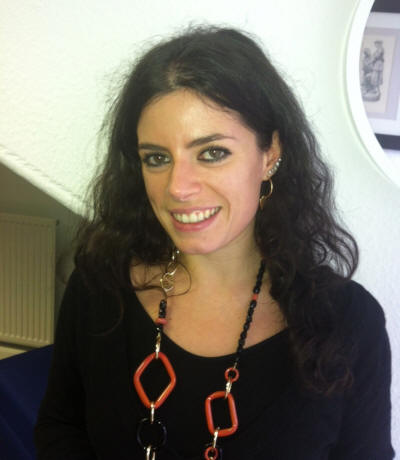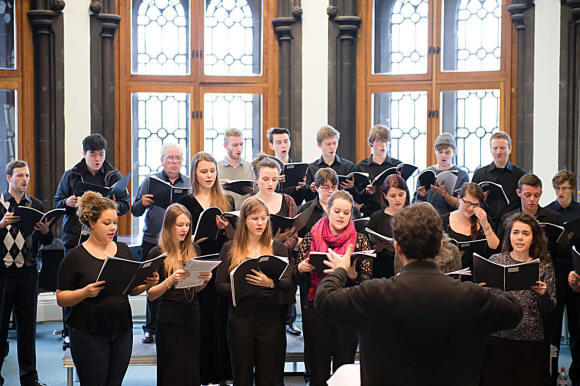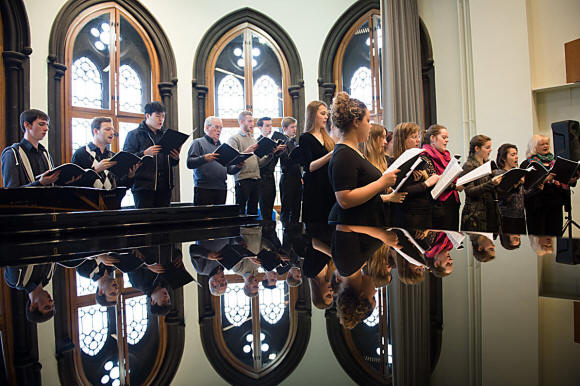|
Edited
by Frank R. Shaw, FSA Scot, Dawsonville, GA, USA
Email:
jurascot@earthlink.net
There are so many good
Burnsians “out there” and I must tell you about one I met via email over the
past few days. I received a message last week from my editor and “boss”,
Alastair McIntyre, advising of the new Burns Choral Project at the
University of Glasgow’s Centre for Robert Burns Studies. I contacted a
friend at the centre and immediately my email was passed along to the
appropriate party. Then “boom” - like a split of lightening in the darkness
of a moonless and starless night - I received a response from someone
unknown to me offering information I needed for the article. And remarkably,
after further contact, she even offered to write the article herself. So
today Dr. Vivien Williams, a graduate of the University of Bari (Italy),
founded in 1925, will explain the project to us. The University at Bari has
a student population of approximately 60,000 and is one of the most
prestigious universities in southern Italy.
Dr Williams, “born half an Italian, and bred a whole one”, was brought up in
an Anglo-Italian family in Apulia, the ‘heel’ of Italy’s ‘boot’. She has
always actively pursued her interests in literature and has won a number of
literary prizes, both national and international, for short stories and
poetic translations. Since her teens she cultivated an interest in the
bagpipe, and in 2010 she moved to Glasgow to embark on her Ph.D. and
completed it with a thesis on ‘The Cultural History of the Bagpipe in
Britain, 1680-1840’.
Dr. Vivien Williams talking about her thesis
Dr. Williams has been very
busy since coming on board at the University of Glasgow. She is currently a
Research Assistant in musicology at the Centre for Robert Burns Studies,
working on the project ‘Editing Robert Burns for the 21st Century’. She also
tutors in Scottish Literature and English Literature. Vivien is the
co-author of the Anglophone civilization book ACCESS to Great Britain and
the English-speaking World (2007), and her chapter ‘“All the Bagpipes in the
World are here, and they fill Heaven and Earth”: the Bagpipe in the Romantic
Construction of Scottish Identity’ will be available later in 2014 in the
collection Assembling Identities. And last but not least, Dr. Williams is a
Hunterian Associate with a project on Bagpipes in Art.
When I asked if it might be possible for her to get the article to me by
Wednesday of this week, she quickly replied: “Dear Frank, sure, I'll start
working on the piece right now! And I'll make sure it's with you, together
with the rest of the material, by Wednesday.” So hats off to someone I did
not know who had the information to me by today, Monday, not Wednesday. I
have been referring to her all week as “my newest best friend!” (6.16.14,
FRS)
The Centre for
Robert Burns Studies is happy to announce
the launch of a new website!
http://www.burnschoral.glasgow.ac.uk/
Article By Dr. Vivien Williams

Dr. Vivien Williams
This new interactive resource
is one of the main outcomes of the project ‘Robert Burns Choral Settings –
from Schumann to MacMillan’, supported by the University of Glasgow’s
Chancellor’s Fund and the CRBS. The Chapel Choir at the University of
Glasgow has recorded performances of a selection of choral settings of
Robert Burns’ songs for streaming. Our interactive website provides
information about each of the settings and their composers.
The recordings feature a range of original compositions and arrangements of
traditional tunes, which by no means claim to make up a comprehensive list
of all the choral material available for Robert Burns’ songs. The aim was,
in fact, to give a sample of the different musical inspiration Burns has
been the centre of right from the initial publication of his works. For the
Project, only twenty songs have been selected, by fourteen different
composers, from the early nineteenth century to present day.

Chapel Choir performing some of the project
songs on 30th January 2014
The earliest setting in our
range is Thomas Attwood’s glee ‘A Rose-Bud by my Early Walk’, and it
probably one of the earliest choral composition of a Burns song (c. 1819).
The piece is very much in line with the tastes of the time, as glees were
very fashionable after the second half of the eighteenth century.
But composers have not necessarily adhered to tradition – even in their
choice of text. André Gedalge in fact set to music ‘Combien Triste et
Longue’ (‘How Lang and Dreary is the Night’) with a French text by Henri
Potez who was a close friend of Auguste Angellier, one of Burns’ most active
French translators. His selection of text is unusual, and we have not
located any other settings of this text by other European composers. Also
quite fascinating is Robert Schumann’s choice to set Burns’ ‘Address to the
Toothache’, which is titled ‘Zahnweh’. This piece comes from a series of
five works (Fünf Lieder) of unaccompanied part-songs for mixed voices on
Robert Burns’ texts. Schumann was very taken by the lyrical side of Burns’
poetry, so the ‘Address to the Toothache’ makes quite an atypical selection.
It is truly remarkable that composers and musicians worldwide have found
inspiration in Burns’ work: they really do reveal the universality of the
Bard’s poetic and musical voice.
One of the highlights of the project is that it features two world
premieres: ‘Ae Fond Kiss’ and ‘The Deuk’s Dang o’er my Daddie, O’, by
Francis George Scott. We have found the scores for these compositions in
holograph manuscripts held at the Scottish Music Centre. There were various
versions of the manuscripts, in different states of completions: after a
long work on a reconstruction of what may have been the final piece Scott
had in mind, the scores had to be typeset for recording. To our knowledge it
is the first time these pieces have ever been performed.

University of Glasgow Chapel Choir
Of course Burns’ musical
inspiration was not exhausted with the twentieth century, and indeed
composers today keep finding in the Bard new creative stimuli. From James
MacMillan's 'So Deep' and 'The Gallant Weaver', to Tommy Fowler's
avant-garde 'Tam's Moral' and Glasgow University graduate Katy Cooper’s ‘A
Man’s a Man’ – each musical creation has taken Burns’ work to different
places entirely: linguistically, musically, and culturally. |

